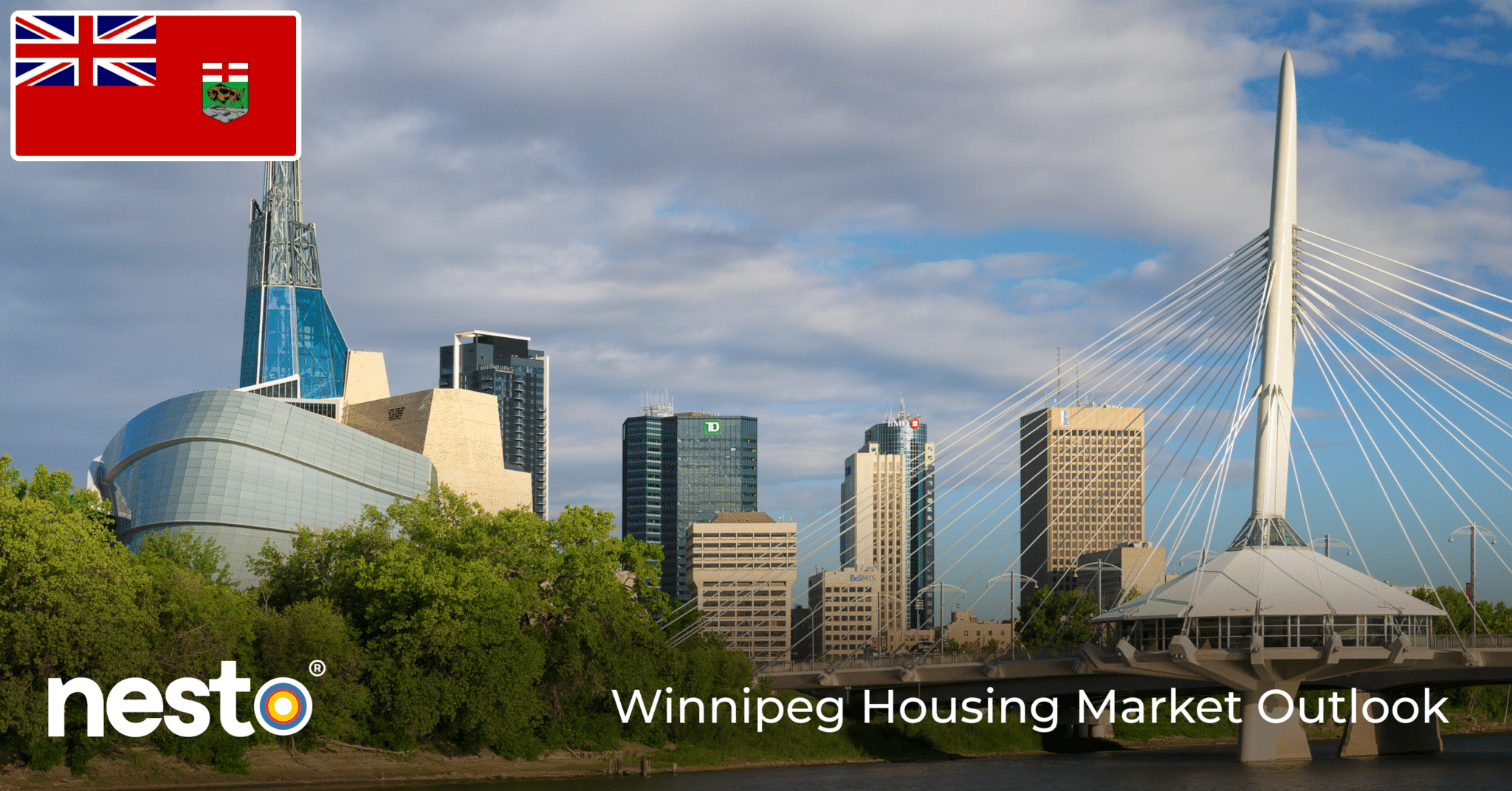Winnipeg Housing Market Outlook 2025

Table of contents
Winnipeg Housing Market Report Summary
- The average selling price of a home in Winnipeg increased by 8.2% year-over-year to $387,800 in May 2025.
- The average selling price of a single-family home in Winnipeg increased by 8.4% year-over-year to $409,600 in May 2025.
- The average selling price of a townhouse/multiplex in Winnipeg increased by 7.0% year-over-year to $337,000 in May 2025.
- The average selling price of a condo in Winnipeg increased by 4.3% year-over-year to $236,000 in May 2025.
- The average rent in Winnipeg unchanged by 0.0% year-over-year to $1,663 for May 2025.
- July 10, 2025: Today’s lowest mortgage rate in Winnipeg is
for a 5-year fixed.
Composite Home Prices
![]()
The average selling price of a home in Winnipeg was $387,800 for the month of May 2025, that’s increased by 0.6% compared to the previous month. On a year-over-year basis, Winnipeg home prices have increased 8.2% over the last 12 months.
Single-family Home Prices
![]()
The average selling price of a single-family home in Winnipeg was $409,600 for the month of May 2025, that’s increased by 0.6% compared to the previous month. On a year-over-year basis, single-family home prices in Winnipeg have increased by 8.4% over the last 12 months.
Townhouse and Multiplex Prices
![]()
The average selling price of a townhouse in Winnipeg was $337,000 for the month of May 2025, that’s increased by 0.8% compared to the previous month. On a year-over-year basis, the price of a townhouse in Winnipeg has increased by 7.0% over the last 12 months.
Condo Prices
![]()
The average selling price of a condo in Winnipeg was $236,000 for the month of May 2025, that’s increased by 1.1% compared to the previous month. On a year-over-year basis, the price of a condo in Winnipeg has increased 4.3% over the last 12 months.
We’re curious…
Winnipeg Housing Market Summary
Data from the Winnipeg Regional Real Estate Board (WRREB) indicates that the average price of resale residential homes sold across Winnipeg in May 2025 was $387,800, and it increased of 8.2% compared to a year ago.
WRREB also reported a sales-to-new-listings ratio (SNLR) of 72%, indicating a sellers market in Winnipeg for May 2025.
Detached and Condo Prices Hit New Highs in Winnipeg Amid Balanced Conditions
According to the Winnipeg Regional Real Estate Board (WRREB), the housing market showed strength in May 2025 as residential detached and condo prices reached record levels, while sales stayed above long-term trends. Total MLS sales reached 1,789, up 4% year-over-year and 3% above the five-year average. Detached home sales rose 6% to 1,259, with the average price climbing 8% to $459,320. Condo sales declined 16% to 232 units, but the average price still rose 7% to a record $297,864.
● Detached average price: $459,320 (+8%)
● Condo average price: $297,864 (+7%)
● Active listings (all property types): 3,650 (-11%)
● Total MLS dollar volume: $737M (+12%)
Hot Spots for Price Gains in Winnipeg
Detached homes in both Winnipeg and surrounding regions saw price growth, with Winnipeg averaging $476,667 (+8%) and areas outside Winnipeg reaching $429,396 (+8%). Inventory was also tighter in the condo market, with active listings down 3% city-wide and sales slowing more sharply outside the city. Residential attached homes posted the strongest sales growth, up 25% from May 2024, with an average price of $381,871.
Market leaders included Waverley West and East Transcona for detached sales in Winnipeg, as well as Osborne Village and Fort Richmond for condominiums. Outside the city, Steinbach saw the highest activity in detached homes, while Niverville/Ritchot led in condo sales.
Impact on Mortgages and Monetary Policy
For homebuyers, Winnipeg remains one of the most stable and affordable large markets in Canada. Detached home prices are rising, but not at a pace that significantly worsens affordability. If the Bank of Canada cuts rates in the coming months, buyers may gain added flexibility, especially with stable inventory levels. Renewers may find that strong appraisal values help them qualify without surprises with lower loan-to-value (LTV) ratios. While refinancers, especially in detached and townhome segments, could unlock more equity. As inflationary pressures abate nationally and Winnipeg continues its steady performance, the BoC has added room to ease rates without stoking risk in this resilient Prairie market.
Month-over-Month Market Expectations for Winnipeg
Transactions – Number of Sales
![]()
The number of sales in Winnipeg was 2,030 during May 2025, that’s increased by 21.3% compared to the previous month. On a year-over-year basis, sales in Winnipeg have increased by 5.0% over the last 12 months.
New Listings
![]()
The number of new listings in Winnipeg was 2,826 during May 2025, that’s increased by 16.3% compared to the previous month. On a year-over-year basis, new listings in Winnipeg have increased by 3.5% over the last 12 months.
Real Estate Market
![]()
The sales to new listings ratio (SNLR) in Winnipeg was 72% during May 2025, indicating a sellers market. On a monthly basis, that’s increased by 4.3% compared to the previous month. Winnipeg’s yearly sales to new listings ratio has increased by 1.4% over the last 12 months.
The sales to new listings ratio (SNLR) measures the number of home sales compared to new listings. An SNLR under 40% suggests a buyer’s market in which buyers have the upper hand and more negotiating power. An SNLR between 40% and 60% is a balanced market, while an SNLR of over 60% is considered a seller’s market.
Annual Changes to Composite Home Prices in Winnipeg
We’re curious…
Winnipeg Market Rents Summary
The average rent in Winnipeg was $1,663 for the month of May 2025, which unchanged by 0.0% on a year-over-year basis.
The average rent for a bachelor apartment in Winnipeg was $0 for the month of May 2025, which 0 by 0% on a year-over-year basis.
The average rent for a 1-bedroom apartment in Winnipeg was $1,443 for the month of May 2025, which increased by 2.0% on a year-over-year basis.
The average rent for a 2-bedroom apartment in Winnipeg was $1,762 for the month of May 2025, which unchanged by 0.0% on a year-over-year basis.
The average rent for a 3-bedroom apartment in Winnipeg was $1,443 for the month of May 2025, which unchanged by 0.0% on a year-over-year basis.
How Does Renting Compare with Homeownership in Winnipeg?
Each $100,000 in mortgage balance costs an average of $521.15 per month on nesto’s lowest fixed 5-year rate at
Rates used for calculation are those offered on insured purchases with less than a 20% downpayment on a 25-year amortization. Canada’s policy rate is 2.75%, and nesto’s prime rate is set to 4.95%.
Rental Price Changes by City
Rental Price Changes by Province
Rental Price Growth by Housing Type
We’re curious…
Frequently Asked Questions on Winnipeg Housing Market Outlook for 2025
Will Winnipeg home prices increase in 2025?
Winnipeg’s home prices are expected to remain stable, with a slight upward movement in 2025. The market’s affordability and growing demand will support moderate price gains.
Is Winnipeg a good city to buy a home in 2025?
Winnipeg offers some of Canada’s most affordable housing options, making it ideal for first-time buyers and investors looking for substantial value.
How will mortgage rates impact Winnipeg’s housing market?
Declining mortgage rates will improve affordability, allowing more buyers to enter the market and driving demand for single-family homes.
What trends will shape Winnipeg’s housing market in 2025?
Key trends include affordability, demand for family-sized homes, and population growth driven by increased immigration.
How does Winnipeg’s home affordability compare to other Canadian cities?
Winnipeg remains one of Canada’s most affordable housing markets, with prices well below the national average. This affordability will continue to attract buyers in 2025.
Why Choose nesto
At nesto, our commission-free mortgage experts, certified in multiple provinces, provide exceptional advice and service that exceeds industry standards. Our mortgage experts are non-commissioned, salaried employees who provide impartial guidance on mortgage options tailored to your needs and are evaluated based on client satisfaction and advice quality. nesto aims to transform the mortgage industry by providing honest advice and competitive rates using a 100% fully digital, transparent, seamless process.
nesto is on a mission to offer a positive, empowering and transparent property financing experience – simplified from start to finish.
Contact our licensed and knowledgeable mortgage experts to find your best mortgage rate in Canada.
Ready to get started?
In just a few clicks, you can see our current rates. Then apply for your mortgage online in minutes!















